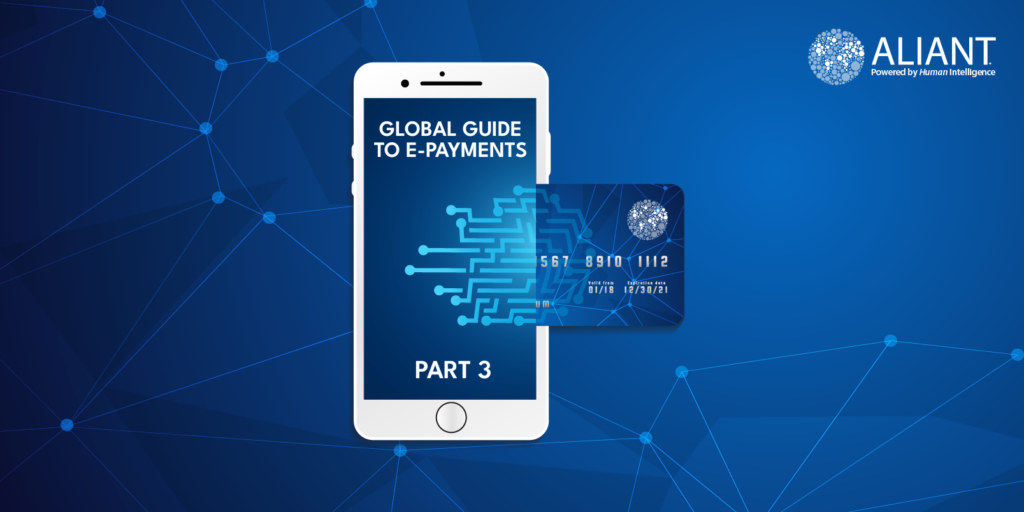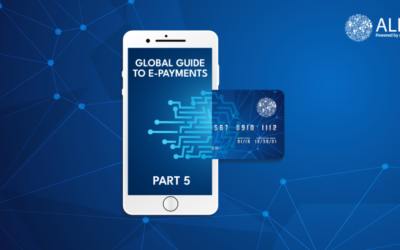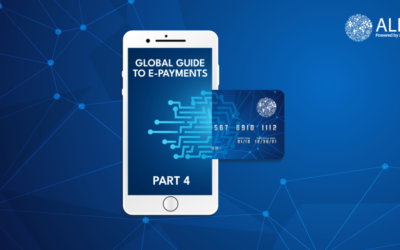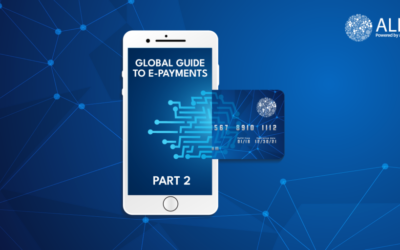Introduction on Global E-Payments Guide by Aliant Corporate PAG.
Global E-payments Guide was created by Aliant’s Corporate Practice Group, where our experienced and well established lawyers from France, Italy, the Netherlands, Finland, Cyprus, U.K, Israel, U.S.A and China have answered some fundamental and up-to-date questions on E-payments. If you are interested in E-payments in any of the beforementioned countries please follow these five part series.
What do we mean by e-payments?
By “E-payments” (also called digital payments), we mean any payment for a good or service without the use of cash, made electronically, i.e. telematically or by internet, using an electronic device (from the traditional payment cards to computers, smartphones, tablets, smartwatches, as well as the Point Of Sale or “POS”, either contactless or with magnetic stripe reading).
Why are e-payments important?
Even before the pandemic, global digital payments industry has been involved in many innovations, including mobile wallets, P2P mobile payments, real-time payments and cryptocurrencies. This new, simple-to-use, cashless payment methods have become an appealing alternative for billions of people and attracted many users.
Over the years, China and the United States developed into the world’s leading digital payments markets, but Europe is set to witness the most impressive digital payments growth. However, with social distancing rules in place, more people started embracing contactless payments as a safer way to manage their money in both developed and emerging countries and consumers are increasingly inclined to use E-payments.
From the side of the E-payment service providers, even large players such as Amazon, PayPal, Apple and Facebook are continuously investing in online and mobile payment solutions and the ongoing changes in e-commerce solutions, with the transition from individual separate online shops to integrated platforms, is creating space for new business models and new opportunities for E-payments.
In conclusion, due to fast technological developments and the increasing of consumers attitude to pay products and services by their online banking accounts as well as by E-payments and mobile payments via smartphone applications, the transition to a cashless society is inevitable and irreversible, therefore this sector is very profitable at the present and will remain productive for a long time.
Do you need any help in e-payment market?
If you are an entrepreneur who wants to succeed in the E-payments market, you know that in the era of global e-commerce, after launching your services locally, you have to spread beyond national borders and therefore operate in different countries, often subject to very different rules and policies.
How do you choose where to start an E-payment service or in which country is it preferable to expand a service already successfully launched in your country? Are administrative authorisations and/or specific requirements to operate payment services? Which activities are allowed? Are there public supervisory auditing of the activity?
To help tackle these questions, Aliant presents an overview of the different legal frameworks for payment services around the world which, without being considered exhaustive or as a legal opinion, aims of providing entrepreneurs and investors who operate internationally and who are interested in payment services with a preliminary tool for choosing the markets in which to launch or expand their payment services.
This general information is merely offered on the basis that it is not a substitute for legal advice and we cannot accept any kind of liability incurred in reliance on their content.
Of course, for any in-depth analysis or specific legal assistance in this sector, Aliant’s experts are available to advise and share their global expertise in the field of digital payments.
Do e-payment service contracts have to adopt a specific form and / or fulfil a predetermined content and / or are they subject to any other legal constraints?
EUROPEAN UNION (EU)*
Since framework contracts and the payment transactions are more common than single payment transactions, in case of a payment account or a specific payment instrument it is necessary a framework contract.
Framework contracts must include all information and conditions which must be provided to User before signing a contract: information on PSP, on use of the payment service (e.g., main characteristics, procedure for giving consent to initiate or execute an e-payment, maximum execution time for e- payment, spending limits), on charges, interest and exchange rates, on means of communication and frequency of information provided, on safeguards and corrective measures and on changes to, and termination of, the framework contract.
At User request and at any time during the contractual relationship, PSPs must provide contractual terms of the framework contract on paper or on another durable medium.
* In order to create a single payment area where European citizens and businesses have easy access to safe cross-border payments with the same charges and the same rules the EU adopted in 2007 the first payment services directive (the so-called PSD1) applicable inside the European Economic Area to all payments executed in other way that cash, electronic payments included, establishing the rights and obligations related to this kind of services as well as the set of information that operators must give to users, and introducing a new figure of financial intermediary (payment institutions) allowed to provide payment services in competition with banks.
A new directive on payment services has been adopted in 2015 and became applicable starting from 2018 (the so-called PSD2) with the aim to improve the first set of rules and include new digital payment services, such as mobile and internet payment services, preserving consumers from frauds and abuses.
FRANCE
The electronic payment service framework contract must include some information provided for by the French Monetary and Financial Code, in particular information on:
- the payment service provider;
- the use of a payment service, including a description of its main characteristics, the form and procedure for giving consent to initiate, the possibility, if any, to agree on spending limits;
- fees, interest rates and exchange rates;
- communication between the user and the payment service provider, in particular the technical requirements applicable to the user’s equipment;
- protective and corrective measures, including a description of the measures that the user must take to maintain the security of a payment instrument;
- modification and termination of the contract.
This information must once again be communicated in clear and easily understandable terms and form, in paper form or in another durable medium. The payment service provider may also, to fulfil this obligation, provide a copy of the draft framework contract.
If, at the customer’s request, the framework contract is concluded by a means of distance communication that does not allow the payment institution to comply with the previous paragraph, the latter fulfils its obligations immediately after the conclusion of the framework contract.
ITALY
As for the information which must be supplied to customers, in the same way the Consolidated Law on Banking – TUB and Supervisory provisions issued by Bank of Italy establish also that PSP are subject to the specific rules provided for all financial intermediaries on the form of contracts, that subject to exceptions have to be drawn up in writing and a copy has to be given to customers on paper or on another durable medium.
Electronic signature is allowed but only within the limits established by Italian law: it must be a digital or another type of qualified electronic signature which, in any case, must guarantee the security, integrity and immutability of the document and, in a unequivocal way, who is its author. Therefore, simply clicking on a website is not sufficient to conclude an e-payment contract.
The NETHERLANDS
E-payment service contracts are governed by so called framework agreement.
This framework agreement is in art. 7:514 preamble and under (o) BW defined, in compliance with the European rules (PSD2), as the ‘agreement governing the execution of separate and successive payment transactions and which may include the obligations and conditions for the opening of a payment account’.
FINLAND
Generally, e-payment service contracts should contain at least main characteristics of the payment service to be provided, the fee for the use of the service, duration and termination clause of the contract and dispute procedure.
Under the Act on Payment Services, unreasonable terms or ones that do not fall within the scope of payment services activities are not allowed. It is specified that a contract term is always unreasonable, if it requires the acquisition or use of goods, services or other commodities outside the scope of the payment service activities to an extent that is inappropriate from the point of view of the customer, or if the right of the customer to conclude contracts with another entrepreneur is restricted.
CYPRUS
Since framework contracts and the payment transactions are more common than single payment transactions, in case of a payment account or a specific payment instrument it is necessary a framework contract.
Under CHAPTER 3 of the Payment Services and Access to Payment Systems Laws of 2018 (PS Law), Framework contracts must include all information and conditions which must be provided to User before signing a contract: information on PSP, on use of the payment service (e.g., main characteristics, procedure for giving consent to initiate or execute an e-payment, maximum execution time for e- payment, spending limits), on charges, interest and exchange rates, on means of communication and frequency of information provided, on safeguards and corrective measures and on changes to, and termination of, the framework contract.
At User request and at any time during the contractual relationship, PSPs must provide contractual terms of the framework contract on paper or on another durable medium.
UNITED KINGDOM (UK)
There are no prescribed forms or content, however, communication rules require that information provided must be made available in:
- easily understandable language and in a clear and comprehensible form
- English (or other agreed language)
- in the case of single payment service contracts, in an easily accessible manner
- on paper or another durable medium where the customer requests this
No charges may be levied for providing any of this information.
ISRAEL
The Payment Services Law states that if the e-payment services provider is providing other services, he must separate the contracts. (Paragraph 3)
The e-payment services provider’s contract must include a simple and concise discerption of the essential terms and they must be stated clearly and in one place. (Paragraph 7)
It is worth noting that the law gives the Minister of Justice the authority to set regulations. Such regulations have not been set yet.
However, a draft of such regulations has been prepared by the Ministry of Justice which sets the following regulations on such contracts:
- An e-payment services provider must inform the costumer of all essential details of the agreement.
- There is also a list of items which will always be considered essential details.
UNITED STATES OF AMERICA (USA)
Basically, it is not required a specific form for e-payment services’ contracts nor to fulfil a predetermined content.
In the same way, no peculiar legal constraints must be provided by PSP so that they are ultimately free to determine how the service agreement can be concluded between the parties and what it has to rule.
CHINA
According to the Measures and the Detailed Rules for the Measures, a payment institution shall formulate a payment service contract to clarify its rights and obligations with customers, principles of dispute settlement, liability for breach of contract and other matters. A payment institution shall publicly disclose the terms and conditions of the payment service contract, and shall report the payment service contract, with such terms and conditions to the local branch of the People’s Bank of China (PBC) for files and records. Of course, the payment service contract shall conform to the Civil Code of People’s Republic of China (PRC), and other relevant laws in the Country.
Meanwhile, payment service contract, including legal and regulatory requirements, shall be available in the form of hard copies or electronic copies.
A payment institution shall disclose the contents of the standard terms of its payment service contract in a prominent position in its business premises. If a payment institution has an Internet website, it shall also disclose in a prominent position on the homepage of the website.
The standard terms of the payment service contract of a payment institution shall follow the principle of fairness, and it shall comprehensively and accurately define the rights, obligations and responsibilities between the payment institution and the customers. The payment institution shall draw the customer’s attention to the content in the terms of the format of the payment service contract that exempts or limits its liability, and provides clear explanation to customers. Where a payment institution intends to adjust the terms of the format of a payment service contract, it shall notify the customer 30 days prior to the adjustment and provide a reminder of the contents to be adjusted. If customers fail to perform the obligation of notification, the adjusted terms shall not be binding on customers.
Is there any specific information that e-payment services’ providers must provide to customers (business / retail) before the closing of a service contract?
EUROPEAN UNION (EU)
In the interest of transparency, Title III of PSD2 (Transparency of conditions and information requirements for payment services, art. 38-60) lays down the harmonised requirements needed to ensure that necessary, sufficient, and comprehensible information is given to Users with regard to the payment service contract and payment transactions, with a derogation from information requirements for low-value payment instruments and electronic money. If the User is not a consumer, PSP and User may agree that rules on transparency shall not apply in whole or in part.
The basic principle is that the Users must be informed, before being bound to an e-payment contract or offer, of the identity and contact details of the PSP, of any costs or charges borne by the User and of the competent authority in the country where the payment transaction is executed. After the operation (or periodically, in the case of framework contracts), PSPs will provide Users with a certain identification of the operation and details of the costs incurred.
For payments made under a framework contract, PSPs must also inform Users on the main contractual rights and obligations such as, for example, changes to and termination of the framework contract.
No expenses can be charged to users for information duties to be provided by PSPs (unless PSPs and users have agreed on a more frequent supply or with tools other than those provide for in the contract). At User’s request, information have to be provided on paper or on another durable medium (such as printouts by account printers, CD-ROMs, DVDs, the hard drives of personal computers on which electronic mail can be stored, and internet sites, provided that such sites are accessible for future reference, for a sufficient period of time for the purposes of accessing the information and provided that these sites allow the reproduction of the information stored there in an unaltered form).
FRANCE
In compliance with the European rules (PSD2) information must be provided by electronic payment service providers, in particular before the user of a payment service is bound by a contract relating to an isolated payment transaction.
This information is in particular:
- the precise information or the unique identifier that the payment service user must provide for the purposes of initiating or correctly executing his payment order;
- the maximum execution time in which the payment service is provided;
- all fees payable by the user and, where applicable, details of these fees;
- where applicable, the real or reference exchange rate that must be applied to the payment transaction.
This information must be communicated, free of charge, in clear and easily understandable terms and form, in paper form or on another durable medium, and can be delivered by providing a copy of the draft contract relating to the payment isolated transaction.
If, at the request of the payment service user, the contract relating to an isolated payment transaction is concluded by a means of distance communication which does not allow the payment service provider to comply with the obligations indicated above, the latter satisfies them immediately after the execution of the payment transaction.
ITALY
In compliance with the European rules (PSD2) Bank of Italy, delegated by the Consolidated Law on Banking – TUB, establishes minimum mandatory contents of the information and contractual conditions that the PSP must provide or make available to User of e-payment services.
Information and contractual terms and conditions to be provided in the case payment transactions, which are detailed by the Supervisory Provisions of the Bank of Italy, are substantially the same of PSD2. Therefore, regarding individual payment transactions, prior to initiation of any transaction, PSP shall inform User about:
- identity and nationality of the PSP and competent Authority;
- information or unique identifier to be provided by the User for the payment order;
- maximum time for the execution of the payment;
- charges, interest and exchange rates;
In the case of framework contracts, PSP shall also provide information about:
- main characteristics of the payment service to be provided;
- means, manner and frequency of communications between intermediary and customer;
- safeguards and corrective measures;
- duration of the framework contract and right of User to terminate the contract;
- complaints and arbitration proceedings before Banking and Financial Ombudsman (in Italian, “Arbitro Bancario Finanziario” or “ABF”).
The PSP must also make available Users in its offices and its website the user-friendly leaflet on consumer rights in the field of e-payment services issued by the European Commission based on Directive (EU) 2015/2366, the Practical Guide on the Banking and Financial Ombudsman and the other practical guides issued by Bank of Italy.
The NETHERLANDS
In compliance with the European rules (PSD2) art. 59e BGfo Wft contains a long list of information and conditions that the payment service provider must make available to the payment service user in advance (i.e. before the payment service is offered) (Article 7:516 of the Dutch Civil Code).
The list contains 30 different types of information, among which the main are:
- a description of the main features of the payment service to be offered
- the maximum execution time for the payment services offered
- the detailed information or the unique identifier provided by the payment service provider so that a payment order can be correctly initiated or executed
- the secure procedure according to which the payment service provider notifies the payment service user of suspected or actual fraud and of security threats
FINLAND
In compliance with the European rules (PSD2) and Act on Payment Services, payment service providers have to provide:
- their business name,
- address, contacts,
- business ID,
- the name and contacts of the supervising authority,
- details of the main functions of the service,
- rights of the User,
- expenses,
- terms of use of the service and
- cancellation of the service contract to the User.
CYPRUS
In the interest of transparency, Title III of PSD2 (Transparency of conditions and information requirements for payment services, art. 38-60 of PSD2 transposed into PART III of the PS Law) lays down the harmonised requirements needed to ensure that necessary, sufficient, and comprehensible information is given to Users with regard to the payment service contract and payment transactions, with a derogation from information requirements for low-value payment instruments and electronic money. If the User is not a consumer, PSP and User may agree that rules on transparency shall not apply in whole or in part.
The basic principle is that the Users must be informed, before being bound to an e-payment contract or offer, of the identity and contact details of the PSP, of any costs or charges borne by the User and of the competent authority in the country where the payment transaction is executed. After the operation (or periodically, in the case of framework contracts), PSPs will provide Users with a certain identification of the operation and details of the costs incurred.
For payments made under a framework contract, PSPs must also inform Users on the main contractual rights and obligations such as, for example, changes to and termination of the framework contract.
Under art. 40 of the PS Law, no expenses can be charged to users for information duties to be provided by PSPs (unless PSPs and users have agreed on a more frequent supply or with tools other than those provide for in the contract). Where the payment service provider may impose a charge for information, the charge shall be appropriate and in line with the payment service provider’s actual costs.
UNITED KINGDOM (UK)
In good time before the contract is concluded or immediately after the execution of the transaction if the contract has been concluded at the customer’s request by means of distance communication, such as by telephone, where it is not practicable to provide the information beforehand), the PSP must provide the customer:
- details about the PSP
- details of the payment service(s) to be provided
- charges and interest
- transmission of information
- information about safeguards and corrective measures
- information about the length of the contract
- variation of terms and termination
- information on applicable law and disputes
This can be done by providing the customer with a copy of the draft contract. For distance contracts concluded online, PSPs must provide information beforehand. PSPs can achieve this by, for example, emailing the customer the terms of the framework contract.
ISRAEL
The Payment Services Law states that the e-payment services provider is obligated to inform the client of every essential detail of the extent, details, price and risks of this payment. He must also inform the client that he has an option to cancel the contract and how he can do so. (Paragraph 7)
It is also worth mentioning that it is specifically forbidden to mislead the client in any way (including after the contract is signed).
Misleading details relate to the following: The provider; the service; the method of payment; the time period of the contract including when it is renewed and what needs to be done to renew it; anything regarding timetables; payments; insurance conditions; revocations rights. (Paragraph 8)
However it should be noted that while this information is provided as part of joining an e-payment service, it is clear that costumers do not bother to read the information. As a result of that there is a public debate as to the efficiency of the present requirements. This is accelerated by the fact that many e-payment services are connected to the credit card companies with which the costumer is already engaged (as “add on” services), which is far from being independent.
UNITED STATES OF AMERICA (USA)
Service providers must, in a conspicuous manner:
- disclose fees charged by them and any third-party,
- seek consent to electronic disclosures and notices, and
- must notify consumers of their privacy rights.
CHINA
According to the Measures and the Detailed Rules for the Measures, a payment institution shall determine the items and standards of charges for payment business and report such items and standards to the local branch of the People’s Bank of China (PBC) for files and records.
A payment institution shall also submit statistical statements of payment business, financial and accounting reports and other materials to the local branches of the People’s Bank of China (PBC) for files and records.
In practise, payment institutions shall publicly disclose the charge items and standards of their payment business. So Customers may have a better understanding of the business.
Please follow these series for Part IV where we will discuss user protection of E-payment services as well as crime prevention tools for services and its users.
If you would like to read the entire Global Guide on E-Payments, you can download it here .
FOLLOW US ON LINKEDIN
SEE MORE ALIANT INSIGHTS




